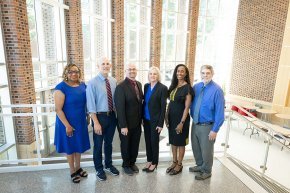

Lenoir-Rhyne receives $1.2 million National Science Foundation grant
Through the Robert Noyce Teacher Scholarship Program, funding will expand diversity in STEM education.
In June, the National Science Foundation (NSF) awarded Lenoir-Rhyne University a grant through the Robert Noyce Teacher Scholarship Program. The award, totaling $1.2 million, will fund eight scholarships each year over the next five years for Master of Arts in teaching students pursuing careers teaching science, technology, engineering and mathematics (STEM) at the secondary level.

“We designed this grant to tackle the dual challenge of addressing STEM teacher shortages – particularly in high-need schools – and creating pathways for underrepresented students to become STEM educators,” shared Hank Weddington, Ed.D., dean of the College of Education and Human Services.
General teacher shortages have made news nationwide in recent years, and those shortages are even more pronounced in the STEM subject areas. By 2028, North Carolina is projected to require more than 300,000 workers to fill critical roles in STEM professions. Sustained economic growth is dependent on the educators who prepare their students to enter those professions.
“Highly qualified STEM educators equip students with knowledge and skills – and ignite a passion for STEM that will guide their students into the workplace,” Weddington explained. “The Noyce grant is a catalyst for transformative change that will allow Lenoir-Rhyne to invest in preparing the highest caliber STEM teachers who will shape the future of innovation through their students.”
Weddington serves as a principal investigator on the grant, entitled “Diverse Teacher Recruitment and Career Kickstart to Succeed in High-Need Schools through Culturally Relevant Teaching.” In addition to expanding STEM education, the grant aims to address another longstanding challenge in education – diversifying the teaching profession to reflect the diversity of student populations.
“Representation matters for students,” said Loury Floyd, Ph.D., assistant provost for academic operations, a co-investigator on the grant team. “Seeing teachers with whom they can identify shows students they can be successful in a subject area – and a career in that area. In STEM, that translates to higher achievement and earning potential.”
One step LR is already taking to recruit a more diverse teacher candidate pool is cultivating partnerships with historically Black colleges and universities (HBCUs) throughout North Carolina to encourage graduates from their STEM programs to consider a future in education.
“HBCUs serve as the primary source of Black educators in the state,” shared Stephanie Woodard, Ph.D., coordinator of the Master of Arts in teaching program and a co-investigator on the grant team. “Notably there is a significant shortage of Black educators in the STEM fields, by making the Master of Arts in teaching more accessible to graduates, this grant will play a pivotal role in rectifying underrepresentation in STEM.”
The goal of equity lies at the heart of the Noyce scholarship program, which honors Robert Noyce, also known as the “Mayor of Silicon Valley.” After completing a Ph.D. in physics at the Massachusetts Institute of Technology in 1953, Noyce co-founded Intel in 1968. His company’s advances in microprocessors made personal computers accessible to the masses, paving the way to the current technological landscape. Before his death in 1990, Noyce advocated strongly for educational equity at all levels to “make sure we are preparing our next generation to flourish in a high-tech age.”
Rounding out the grant-writing team are co-investigators Shaun Williams, Ph.D., dean of the College of Natural Sciences and Mathematics and Jennifer Perkins, Ph. D., visiting assistant professor of chemistry. The team also includes senior personnel Christopher Gordon, Ed.D., assistant professor of education and Jennifer Burris, Ph.D., provost and vice president for academic affairs.
“This is LR’s largest federal grant award on record, and our first NSF grant since 1990,” Floyd remarked. “We are over the moon because it is a prestigious program, but we’re also thrilled to play an intentional and pivotal role in diversifying the teaching profession and, by extension, the STEM professions. This will be life-altering for so many people.”
EIN Presswire does not exercise editorial control over third-party content provided, uploaded, published, or distributed by users of EIN Presswire. We are a distributor, not a publisher, of 3rd party content. Such content may contain the views, opinions, statements, offers, and other material of the respective users, suppliers, participants, or authors.

